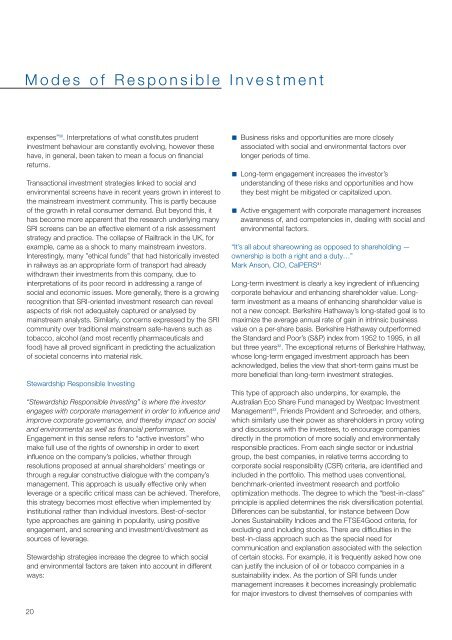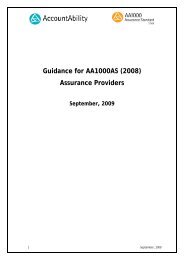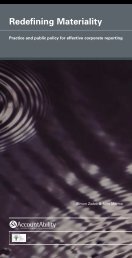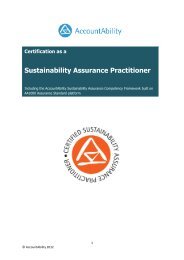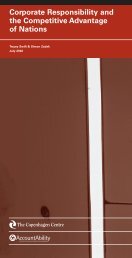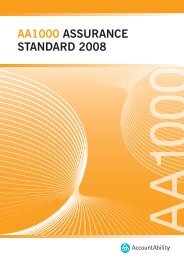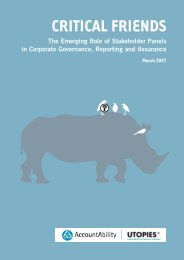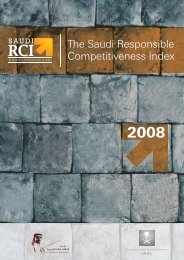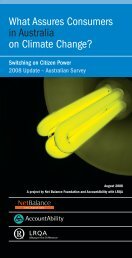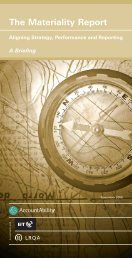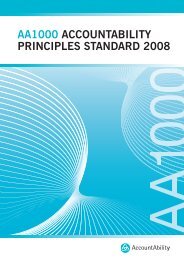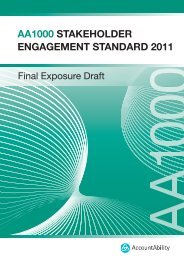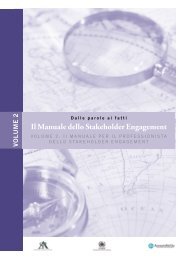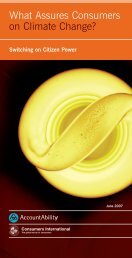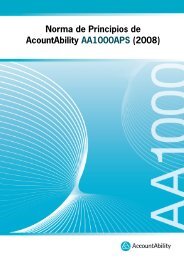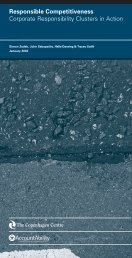Mainstreaming Responsible Investment - AccountAbility
Mainstreaming Responsible Investment - AccountAbility
Mainstreaming Responsible Investment - AccountAbility
You also want an ePaper? Increase the reach of your titles
YUMPU automatically turns print PDFs into web optimized ePapers that Google loves.
Modes of <strong>Responsible</strong> <strong>Investment</strong><br />
expenses” 30 . Interpretations of what constitutes prudent<br />
investment behaviour are constantly evolving, however these<br />
have, in general, been taken to mean a focus on financial<br />
returns.<br />
Transactional investment strategies linked to social and<br />
environmental screens have in recent years grown in interest to<br />
the mainstream investment community. This is partly because<br />
of the growth in retail consumer demand. But beyond this, it<br />
has become more apparent that the research underlying many<br />
SRI screens can be an effective element of a risk assessment<br />
strategy and practice. The collapse of Railtrack in the UK, for<br />
example, came as a shock to many mainstream investors.<br />
Interestingly, many ”ethical funds” that had historically invested<br />
in railways as an appropriate form of transport had already<br />
withdrawn their investments from this company, due to<br />
interpretations of its poor record in addressing a range of<br />
social and economic issues. More generally, there is a growing<br />
recognition that SRI-oriented investment research can reveal<br />
aspects of risk not adequately captured or analysed by<br />
mainstream analysts. Similarly, concerns expressed by the SRI<br />
community over traditional mainstream safe-havens such as<br />
tobacco, alcohol (and most recently pharmaceuticals and<br />
food) have all proved significant in predicting the actualization<br />
of societal concerns into material risk.<br />
Stewardship <strong>Responsible</strong> Investing<br />
“Stewardship <strong>Responsible</strong> Investing” is where the investor<br />
engages with corporate management in order to influence and<br />
improve corporate governance, and thereby impact on social<br />
and environmental as well as financial performance.<br />
Engagement in this sense refers to “active investors” who<br />
make full use of the rights of ownership in order to exert<br />
influence on the company’s policies, whether through<br />
resolutions proposed at annual shareholders’ meetings or<br />
through a regular constructive dialogue with the company’s<br />
management. This approach is usually effective only when<br />
leverage or a specific critical mass can be achieved. Therefore,<br />
this strategy becomes most effective when implemented by<br />
institutional rather than individual investors. Best-of-sector<br />
type approaches are gaining in popularity, using positive<br />
engagement, and screening and investment/divestment as<br />
sources of leverage.<br />
Stewardship strategies increase the degree to which social<br />
and environmental factors are taken into account in different<br />
ways:<br />
Business risks and opportunities are more closely<br />
associated with social and environmental factors over<br />
longer periods of time.<br />
Long-term engagement increases the investor’s<br />
understanding of these risks and opportunities and how<br />
they best might be mitigated or capitalized upon.<br />
Active engagement with corporate management increases<br />
awareness of, and competencies in, dealing with social and<br />
environmental factors.<br />
“It’s all about shareowning as opposed to shareholding —<br />
ownership is both a right and a duty…”<br />
Mark Anson, CIO, CalPERS 31<br />
Long-term investment is clearly a key ingredient of influencing<br />
corporate behaviour and enhancing shareholder value. Longterm<br />
investment as a means of enhancing shareholder value is<br />
not a new concept. Berkshire Hathaway’s long-stated goal is to<br />
maximize the average annual rate of gain in intrinsic business<br />
value on a per-share basis. Berkshire Hathaway outperformed<br />
the Standard and Poor’s (S&P) index from 1952 to 1995, in all<br />
but three years 32 . The exceptional returns of Berkshire Hathway,<br />
whose long-term engaged investment approach has been<br />
acknowledged, belies the view that short-term gains must be<br />
more beneficial than long-term investment strategies.<br />
This type of approach also underpins, for example, the<br />
Australian Eco Share Fund managed by Westpac <strong>Investment</strong><br />
Management 33 , Friends Provident and Schroeder, and others,<br />
which similarly use their power as shareholders in proxy voting<br />
and discussions with the investees, to encourage companies<br />
directly in the promotion of more socially and environmentally<br />
responsible practices. From each single sector or industrial<br />
group, the best companies, in relative terms according to<br />
corporate social responsibility (CSR) criteria, are identified and<br />
included in the portfolio. This method uses conventional,<br />
benchmark-oriented investment research and portfolio<br />
optimization methods. The degree to which the “best-in-class”<br />
principle is applied determines the risk diversification potential.<br />
Differences can be substantial, for instance between Dow<br />
Jones Sustainability Indices and the FTSE4Good criteria, for<br />
excluding and including stocks. There are difficulties in the<br />
best-in-class approach such as the special need for<br />
communication and explanation associated with the selection<br />
of certain stocks. For example, it is frequently asked how one<br />
can justify the inclusion of oil or tobacco companies in a<br />
sustainability index. As the portion of SRI funds under<br />
management increases it becomes increasingly problematic<br />
for major investors to divest themselves of companies with<br />
20


